外研版(2019)必修 第二册Unit 1 Food for thought Grammar Modals课件(共14张PPT)
文档属性
| 名称 | 外研版(2019)必修 第二册Unit 1 Food for thought Grammar Modals课件(共14张PPT) | 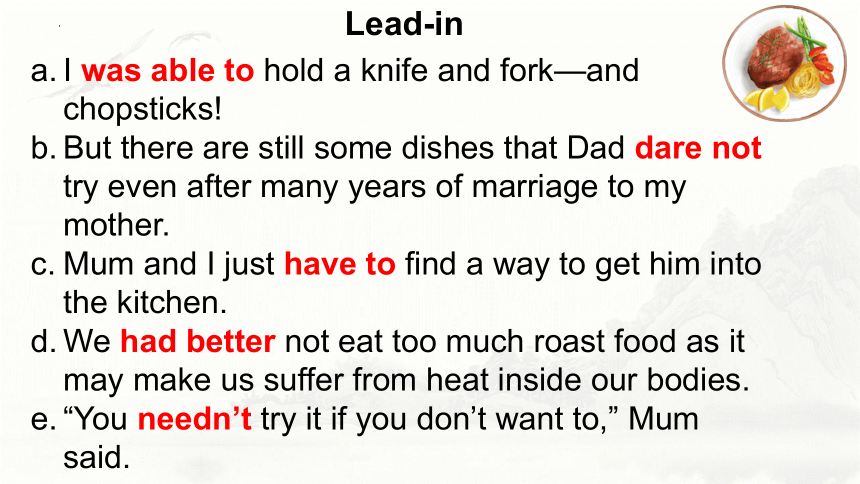 | |
| 格式 | pptx | ||
| 文件大小 | 3.3MB | ||
| 资源类型 | 教案 | ||
| 版本资源 | 外研版(2019) | ||
| 科目 | 英语 | ||
| 更新时间 | 2024-03-07 01:16:09 | ||
图片预览

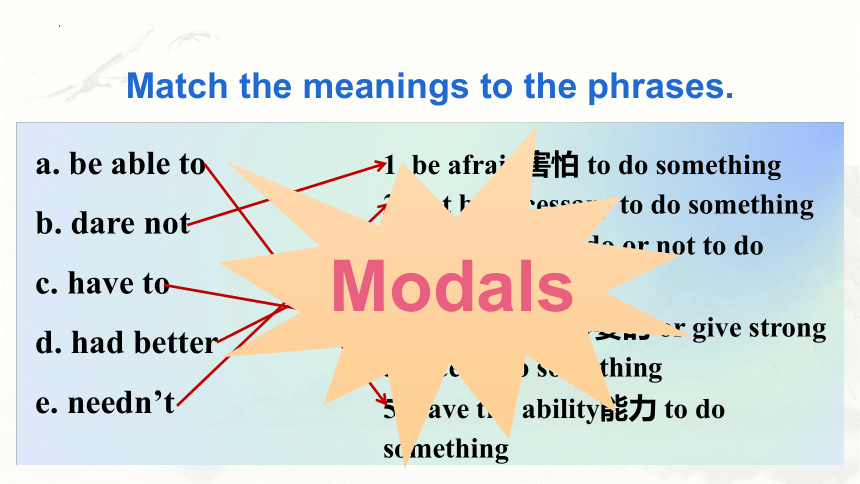
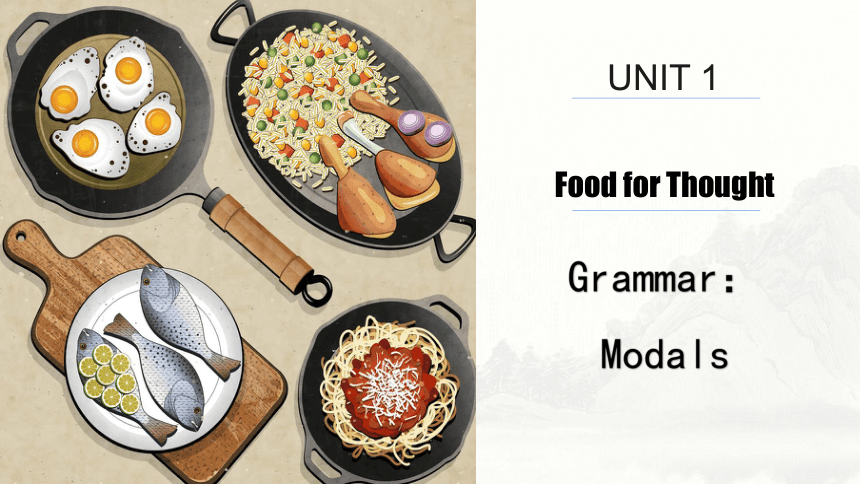
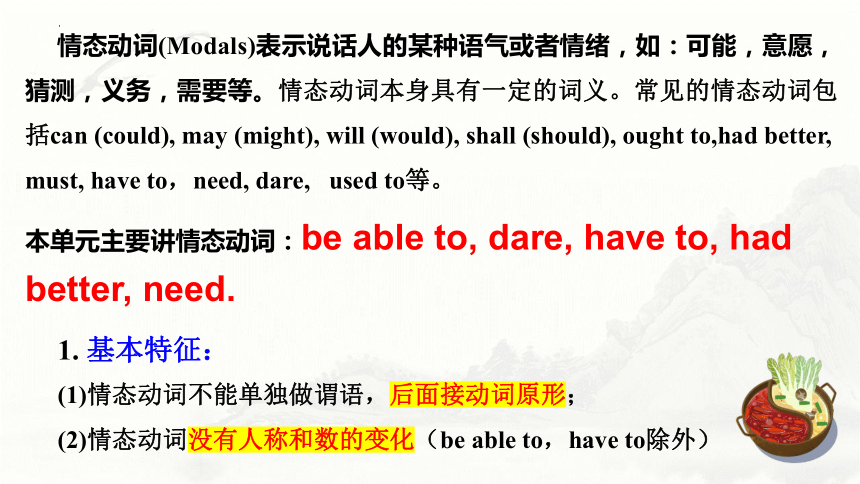
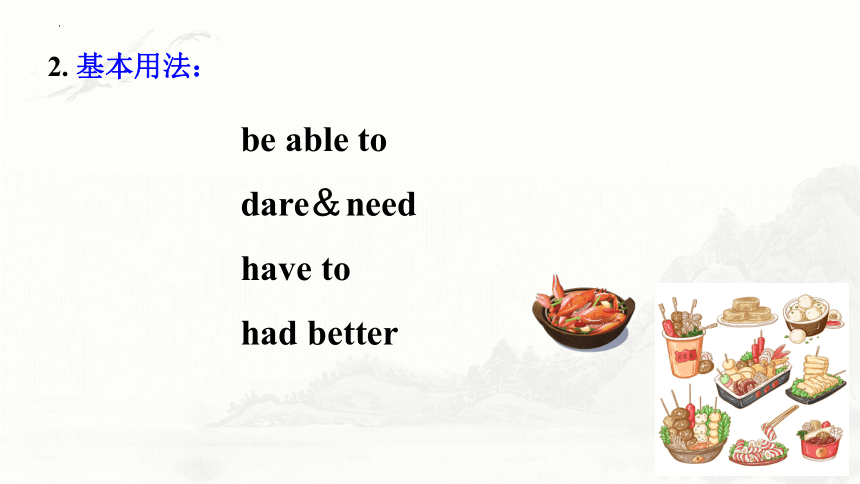
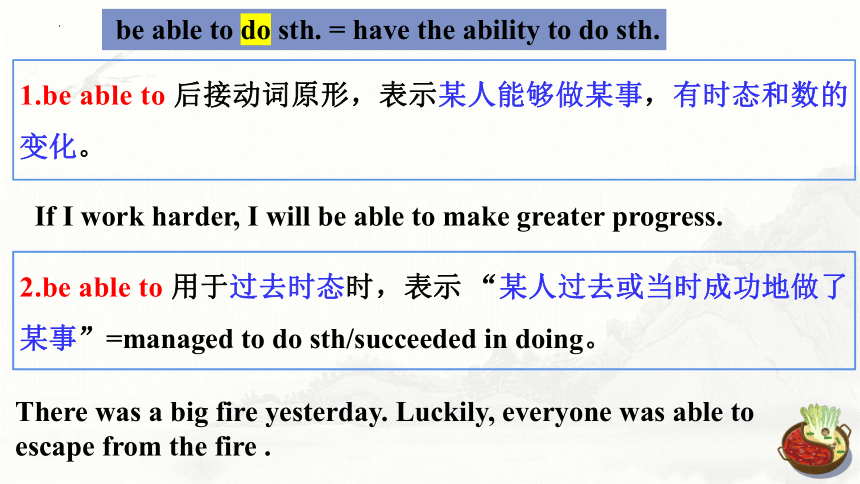
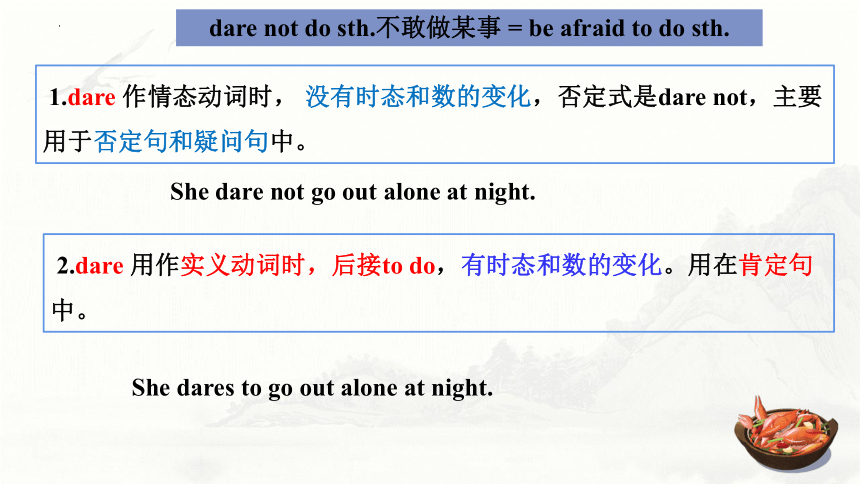
文档简介
Lead-in
I was able to hold a knife and fork—and chopsticks!
But there are still some dishes that Dad dare not try even after many years of marriage to my mother.
Mum and I just have to find a way to get him into the kitchen.
We had better not eat too much roast food as it may make us suffer from heat inside our bodies.
“You needn’t try it if you don’t want to,” Mum said.
a. be able to
b. dare not
c. have to
d. had better
e. needn’t
1. be afraid害怕 to do something
2. not be necessary to do something
3. give advice to do or not to do
something
4. be necessary必要的 or give strong advice to do something
5. have the ability能力 to do something
Match the meanings to the phrases.
Modals
Grammar:Modals
UNIT 1
Food for Thought
情态动词(Modals)表示说话人的某种语气或者情绪,如:可能,意愿,猜测,义务,需要等。情态动词本身具有一定的词义。常见的情态动词包括can (could), may (might), will (would), shall (should), ought to,had better, must, have to,need, dare, used to等。
本单元主要讲情态动词:be able to, dare, have to, had better, need.
1. 基本特征:
(1)情态动词不能单独做谓语,后面接动词原形;
(2)情态动词没有人称和数的变化(be able to,have to除外)
2. 基本用法:
be able to
dare&need
have to
had better
be able to do sth. = have the ability to do sth.
1.be able to 后接动词原形,表示某人能够做某事,有时态和数的变化。
2.be able to 用于过去时态时,表示 “某人过去或当时成功地做了某事”=managed to do sth/succeeded in doing。
If I work harder, I will be able to make greater progress.
There was a big fire yesterday. Luckily, everyone was able to
escape from the fire .
dare not do sth.不敢做某事 = be afraid to do sth.
1.dare 作情态动词时, 没有时态和数的变化,否定式是dare not,主要用于否定句和疑问句中。
2.dare 用作实义动词时,后接to do,有时态和数的变化。用在肯定句中。
She dare not go out alone at night.
She dares to go out alone at night.
needn’t do sth.不必做某事 = not be necessary to do something
1.need 作情态动词时,没有时态和数的变化,用于否定句needn’t或疑问句中。
2.need 作实义动词,有时态和数的变化;后接to do,常用于肯定句
You needn’t come so early.
He needs to earn more money to support such a large family.
1.have to 有时态和数的变化,强调客观需要,意为 “不得不”否定形式是don’t have to,相当于needn’t不必。
2.must无时态和数的变化,强调主观意愿,意为 “必须”。
have to 不得不= be necessary or give strong advice to do sth.
There were no buses; we had to walk all the way home.
I must study hard for my future because knowledge is money
You don’t have to/needn’t bring a gift if you don’t want to.
had better 后接动词原形,意为“最好....”, 无有时态和数的变化。否定式had better not do,构成疑问句时将had置于主语前。 had better not do sth最好别做某事。
had better 最好= give advice to do or not to do sth.
What had we better do? 我们最好怎么办?
She had better apologize to Tom for her had behaviour.
Let’s practice!
If you 1________(dare) try a ‘painful’ diet to stay healthy, this new app is the perfect solution—and you 2_______(need) pay for it! The app works by quickly showing photos of different food. All you 3______(has) to do is select the photos of healthy food. Then you 4_____________(be able to) train your brain to select healthy food in real situations. So, if you’re a sugar addict and 5_________(able) to say no to chocolate or cola, you 6_____(have) better download it now!
daren’t
needn’t
have
will be able to
aren’t able
had
Complete the passage with correct forms
Complete the tips for good table manners with the correct form of the modals in Actvity 1. (P7-3)
While going on your first trip to the UK is exciting, new and different customs can also be confusing. Table manners are no exception. But don't worry - here are some tips:
have to
dare not
had better
needn’t
be able to
完成句子
1. I will _________________________ in three years.
三年后我将能讲英语。
2. I'm afraid you ___________________such a thing.
恐怕你不敢做这样的事。
3. Do I ______________my telephone number and address?
我有必要把电话和地址留下吗?
4. Given his health condition,we ______________________________.
考虑到他的身体状况,我们最好不要让他去那里了。
5. It was raining outside;we __________________.
外面在下雨,我们不得不待在家里。
be able to speak English
dare not do
need to leave
had better not let him go there
had to stay at home
I was able to hold a knife and fork—and chopsticks!
But there are still some dishes that Dad dare not try even after many years of marriage to my mother.
Mum and I just have to find a way to get him into the kitchen.
We had better not eat too much roast food as it may make us suffer from heat inside our bodies.
“You needn’t try it if you don’t want to,” Mum said.
a. be able to
b. dare not
c. have to
d. had better
e. needn’t
1. be afraid害怕 to do something
2. not be necessary to do something
3. give advice to do or not to do
something
4. be necessary必要的 or give strong advice to do something
5. have the ability能力 to do something
Match the meanings to the phrases.
Modals
Grammar:Modals
UNIT 1
Food for Thought
情态动词(Modals)表示说话人的某种语气或者情绪,如:可能,意愿,猜测,义务,需要等。情态动词本身具有一定的词义。常见的情态动词包括can (could), may (might), will (would), shall (should), ought to,had better, must, have to,need, dare, used to等。
本单元主要讲情态动词:be able to, dare, have to, had better, need.
1. 基本特征:
(1)情态动词不能单独做谓语,后面接动词原形;
(2)情态动词没有人称和数的变化(be able to,have to除外)
2. 基本用法:
be able to
dare&need
have to
had better
be able to do sth. = have the ability to do sth.
1.be able to 后接动词原形,表示某人能够做某事,有时态和数的变化。
2.be able to 用于过去时态时,表示 “某人过去或当时成功地做了某事”=managed to do sth/succeeded in doing。
If I work harder, I will be able to make greater progress.
There was a big fire yesterday. Luckily, everyone was able to
escape from the fire .
dare not do sth.不敢做某事 = be afraid to do sth.
1.dare 作情态动词时, 没有时态和数的变化,否定式是dare not,主要用于否定句和疑问句中。
2.dare 用作实义动词时,后接to do,有时态和数的变化。用在肯定句中。
She dare not go out alone at night.
She dares to go out alone at night.
needn’t do sth.不必做某事 = not be necessary to do something
1.need 作情态动词时,没有时态和数的变化,用于否定句needn’t或疑问句中。
2.need 作实义动词,有时态和数的变化;后接to do,常用于肯定句
You needn’t come so early.
He needs to earn more money to support such a large family.
1.have to 有时态和数的变化,强调客观需要,意为 “不得不”否定形式是don’t have to,相当于needn’t不必。
2.must无时态和数的变化,强调主观意愿,意为 “必须”。
have to 不得不= be necessary or give strong advice to do sth.
There were no buses; we had to walk all the way home.
I must study hard for my future because knowledge is money
You don’t have to/needn’t bring a gift if you don’t want to.
had better 后接动词原形,意为“最好....”, 无有时态和数的变化。否定式had better not do,构成疑问句时将had置于主语前。 had better not do sth最好别做某事。
had better 最好= give advice to do or not to do sth.
What had we better do? 我们最好怎么办?
She had better apologize to Tom for her had behaviour.
Let’s practice!
If you 1________(dare) try a ‘painful’ diet to stay healthy, this new app is the perfect solution—and you 2_______(need) pay for it! The app works by quickly showing photos of different food. All you 3______(has) to do is select the photos of healthy food. Then you 4_____________(be able to) train your brain to select healthy food in real situations. So, if you’re a sugar addict and 5_________(able) to say no to chocolate or cola, you 6_____(have) better download it now!
daren’t
needn’t
have
will be able to
aren’t able
had
Complete the passage with correct forms
Complete the tips for good table manners with the correct form of the modals in Actvity 1. (P7-3)
While going on your first trip to the UK is exciting, new and different customs can also be confusing. Table manners are no exception. But don't worry - here are some tips:
have to
dare not
had better
needn’t
be able to
完成句子
1. I will _________________________ in three years.
三年后我将能讲英语。
2. I'm afraid you ___________________such a thing.
恐怕你不敢做这样的事。
3. Do I ______________my telephone number and address?
我有必要把电话和地址留下吗?
4. Given his health condition,we ______________________________.
考虑到他的身体状况,我们最好不要让他去那里了。
5. It was raining outside;we __________________.
外面在下雨,我们不得不待在家里。
be able to speak English
dare not do
need to leave
had better not let him go there
had to stay at home
